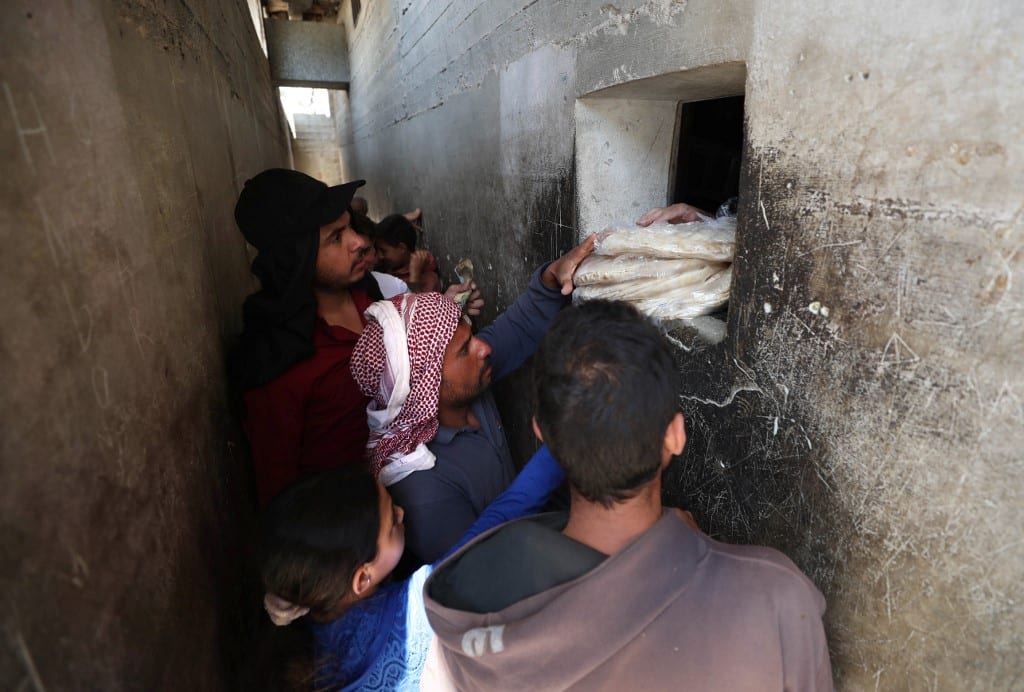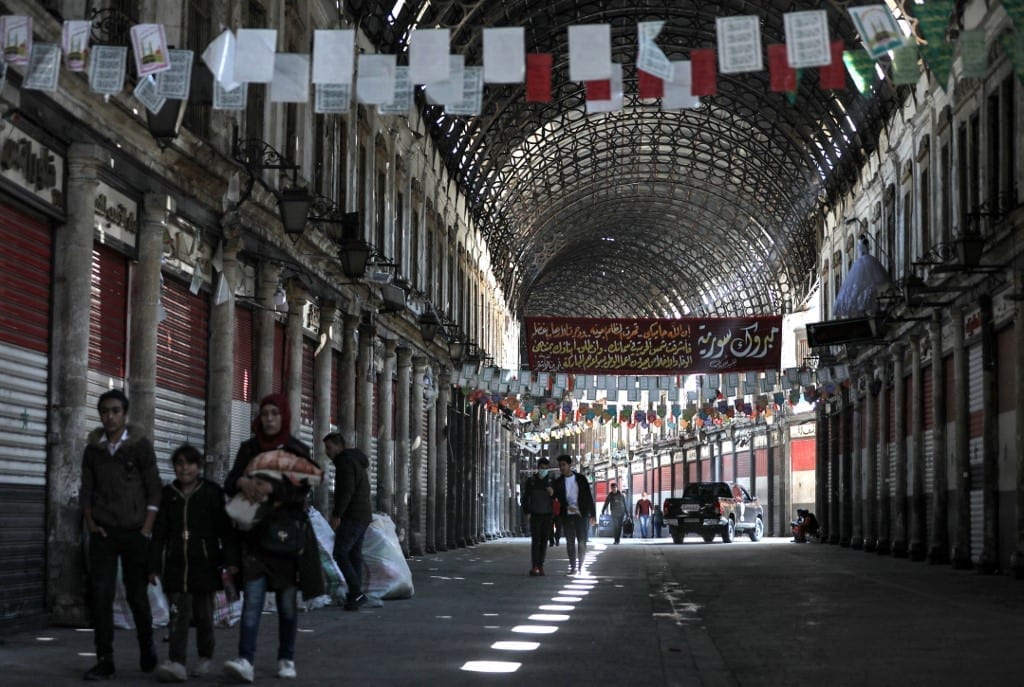
The features of Syrian conversations and discussions, held behind closed doors and in small groups inside their country, have changed due to the fluctuation of events around them. Years ago, their talks focused on the bombings, battles and their daily news, but today the tone of their talks has totally changed, similar to the faces of the passers-by in the markets.
The same thing has occurred in the retreating market movement, resulting in a decline in trade and a recession in luxury products, against a miserable increase in the overcrowding in queues in front of the “Syrian Trade Foundation”, in attempts to purchase a bottle of oil or a kilo of sugar at a lower price.
Most families have removed “luxury products” from their daily lives and haven’t thought about them in several years. The new effects that have started to take place now, is that most families have also started to do without some of the basic things they try to manage to live without. They’ve also started to search for a way to get these things at a lower price. Hala for example, is a Syrian housewife who lives in the Al-Zahira neighborhood in the capital, Damascus.
“We no longer cook meat with our meals after the price of a kilo of meat has increased from 4000 to 16000 Syrian pounds during the past two months,” She tells Daraj.
Consequently, Hala spends a significant amount of her time in front of a small notebook, in which she’s constantly trying to find solutions to combine her salary with her husband’s, which both sit at around 160 thousand pounds (about $ 50), to try to make this amount of money suffice for the household expenses that usually require a minimum of 500 thousand pounds ($ 150), efforts which for the most part are all in vain.
Her brother-in-law, a refugee in Germany, used to send them 100 Euros a month to help them bridge the gap between their level of income and required expenditure. Unfortunately, a few weeks ago, the “Central Bank of Syria” issued a decision under which it limited foreign remittances done through it. Although the bank determines the price of the Euro at 1,400 Syrian pounds, its real price is more than 3000, which means that the “Central Bank of Syria” is taking over half of the transfer value received by Hala’s family.
“Many families are no longer well-off because most of them have been struggling to meet their daily needs”, added the forty-year-old woman.
She continued to narrate the story of her relative who eventually became unable to buy milk or diapers for her baby, who’d resorted to feeding the child cooked starch and using certain fabrics as a replacement for diapers. “Until now, we do not know the impact of the Caesar Act on us as civilians, but all I see right now is that making a living is getting harder day by day.”
During the last 9 years, the lira has fallen from 47 lira for every $1 to 2,500 lira for every dollar and the price of gold has increased to reach 33 times its original value. The average salary of the Syrian citizen used to be equivalent to 3.5 grams of gold, and today this salary is about half a gram. The salary fell from $300 a month on average to about $30, and this salary is now less than one gram of gold.
In accordance with a study prepared by the “Medad” Center for Research, the average Syrian citizen’s income per month has reached $ 37.69, which means that the average income per day comes around to only about $ 1.
There are many things that have overwhelmed the Syrian people’s concerns such as: bread, medicine, daily food prices and medical services’ costs. Families’ conversations have transformed into speeches resembling awareness-raising seminars, in which speakers compete in proposing austerity advice.
There are those who are also discussing the updated (instantaneous) news about the exchange rate of the Syrian pound, which is falling constantly, to the backdrop of the commodities’ prices increasing once again.
There are those who are also discussing the updated (instantaneous) news about the exchange rate of the Syrian pound, which is falling constantly, to the backdrop of the commodities’ prices increasing once again.


Is the “Caesar Act” Against Assad or Civilians?
In conjunction with the US-approved “Caesar Civilian Protection Act, Syrian civilians find themselves to be “the weakest link”. They have no strategies to break sanctions, do not know how to circumvent them, and their fears have been increasing that the law may weaken their ability to secure their daily needs.
This comes amid the heated argument that has been going on for several weeks among the Syrians themselves, including those who believe that the application of the law is necessary to deter the Syrian regime, forcing it to stop the military machine to prevent killing more civilians and weakening its ability to tighten its security grip, hoping that the law would reveal the fate of the more than 100,000 detainees who have disappeared in the Syrian regime’s prisons, whose families know nothing about. They believe that applying this pressure on the regime may weaken its ability to detain more people, and at best force it to start negotiations that will lead to the release of prisoners.
Those who support this opinion believe that the Syrian regime has been starving Syrians in the besieged regions for years, and has been working to impoverish the population and keep them away from thinking about politics, essentially to keep them crawling daily to earn their living. The regime is specifically using this point in the Caesar Act and will starve civilians, knowing Assad himself has adopted starvation as a methodology for ending the protests.


The second view is that the Syrian regime has “adapted” to living with sanctions, and that it can secure alternative plans and resources to help it continue its repression, and that the consequences of enforcing that law will be only affect civilians, who will reach a stage where they will not be able to get their basic needs of food and medicine.
Although the United States confirms that the law excludes food and medicine, and focuses on preventing fuel and logistical support from reaching the Syrian regime, those who oppose this law find that destroying the Syrian lira means destroying their ability to live, and these views summarize the Syrian debate over the consequences of enforcing the law.
Figures About Pain
The Syrian economy has been gradually collapsing during the years of the revolution, until it reached a complete collapse in its industrial and commercial capabilities. The industrial city of Sheikh Najjar had 1600 factories, but today, there are only 400, which are not fully operational because of insufficient fuel supplies, and the industrial sector is suffocating to a lethal degree.
“The Syrian economy is suffering from a lack of immunity that began before 2011,” explains economy consultant Dr. Osama al-Qadi.
Al-Qadi presents a number of figures reflecting the country’s deterioration, the most prominent of which is that 90% of Syrians today are below the poverty line, up from the 50% value of Syrians below the poverty line before the revolution.
In 2005, there were one million unemployed Syrian citizens. Today, they are more than 80% of the total number of Syrians who are unemployed.
Before 2011, Syria ranked the 49th in the world on the “Fragile State Index” of failed states, and then ranked 129 on the scale of the most corrupt countries in 2011.
During the last nine years, the lira has fallen from 47 lira for every $1 to 2,500 lira for every dollar and the price of gold has increased to reach 33 times its original value. The average salary of the Syrian citizen used to be equivalent to 3.5 grams of gold, and today this salary is about half a gram. The salary fell from $300 a month on average to about $30, and this salary is now less than one gram of gold, according to the judge, who considered that all these indicators foretell an economic famine that will cause mass destruction.






